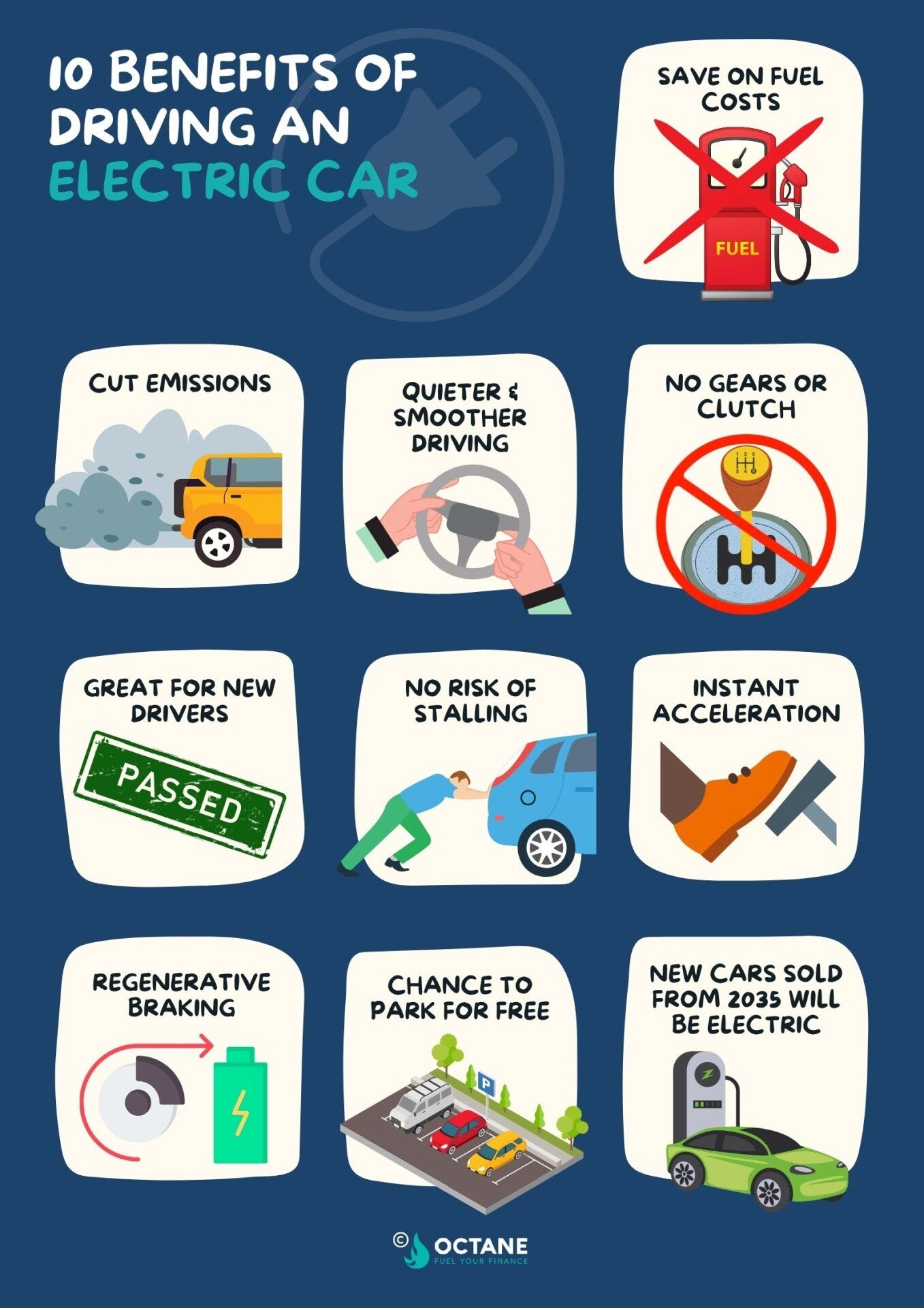Can you learn to drive in an electric car?
Exploring the shift in driving behaviour as the UK speeds towards battery-powered travel
From 2035, all newly manufactured cars sold in the UK will be electric only. This means that for future generations, the way we learn to drive is set to change forever. As the electric revolution beckons, learner drivers will instead be passing their driving tests in battery-powered cars.
This begs the question; Can you learn to drive in an electric car? We answer this and many other EV learner driver-related questions in our article dedicated to the topic. Read on to find out more…
Key Takeaways:
- From 2035, all new cars sold in the UK will be electric-only
- Learning to drive in an electric car is becoming increasingly popular
- EV driving lessons result in an automatic-only license
- Electric cars are easier to drive due to the absence of gears and clutch
- EV drivers can save around £2,600 annually on fuel costs
- Driving an electric car can reduce greenhouse gas emissions by up to 66%
- The AA is pushing for modernised driving tests to reflect the EV trend
Can you learn to drive in an electric car?
Yes, you can learn to drive in an electric car as long as you are of the legal driving age (that’s 17-years-old here in the UK). Not every independent driving instructor currently offers this as an option though, but the main driving schools do accommodate learners who want to drive an electric car.
In fact, it was over 10 years ago (back in 2012) that the first learner driver took a driving test in a battery-powered vehicle. Navdeep Singh from Hull was 17-years-old when he passed his practical driving test in a Vauxhall Ampera model.
Learning to drive in an electric car
The main thing you’ll need to be aware of when learning to drive in an electric car is that the licence you’ll be awarded is for an automatic vehicle only. This means you won’t be taught how to drive a manual car with gears, nor will you legally be permitted to do so once you’ve passed your driving test.
According to the AA, as many as two in five learners would prefer to learn to drive in an electric car instead of a manual. In light of this, motoring specialists the AA have added over 100 electric vehicles to their current fleet of learner cars.
And it’s not just straightforward driving without the gears that appeals to many new and young drivers; it seems the appeal of lower driving costs is a big deciding factor too. The AA claims that drivers can save around £2,600 a year on fuel costs by choosing to drive an electric car. But that’s not all, greenhouse gas emissions can be cut by up to 66% when driving an electric car instead of one with a conventional combustion engine, so it’s good news for the environment too.
So, how does learning to drive in an electric car compare to driving a manual petrol or diesel version? Well, the lesson structure is fairly similar in many ways. Learners are still required to master manoeuvres such as reverse parking and a three-point turn, as well as being able to demonstrate safe driving skills and an understanding of the roads - including signage.
The main difference is that those learning to drive in an electric vehicle will receive additional training about how an EV works and how to charge a battery-powered vehicle using a chargepoint. To reflect an ever-growing demand for automatic driving, the AA has reached out to the Government in a bid to review and modernise the current theory and practical driving exams. Watch this space.
Is it easier to learn to drive in an electric car?
Learning to drive in an electric car is far easier than learning in a manual car. This is because electric cars are automatic so they don’t have gears - which means learner drivers don’t have to master the art of clutch control either! Any budding motorist remembers the days of stalling a car while learning, and now that can be a thing of the past for learner drivers.
In terms of foot pedals, there is just a brake and accelerator to worry about - although some EVs now have what’s called ‘one pedal’ control for an even more simplified driving experience. The dreaded ‘biting point’ and ‘hill start’ under test conditions are no more when you learn to drive in an electric car.
Benefits of driving an electric car:
Let’s face it, gone are the days when electric vehicles were just a pipe dream; now, they are very much a reality and a force to be reckoned with. Here are our top 10 benefits of driving an electric car:

- Say goodbye to fuel costs and save money for life's little luxuries
- Cut your greenhouse gas emissions by up to 66%
- Enjoy a quieter and altogether smoother driving experience
- No need to spend time using the gears and clutch
- An ideal choice for new drivers
- No risk of stalling the vehicle
- Experience instant acceleration
- Benefit from regenerative braking
- Opportunity to park for free in some places
- All new cars sold in the UK will be electric by 2035 anyway
Can a new driver drive an electric car?
Yes, a driver who has just passed their test can drive an electric car. In fact, new drivers will find driving an EV much easier thanks to it having no clutch to contend with at all. As long as the driver has passed both their theory and practical test, a new driver can legally drive an electric car with a standard category B driving licence.
Can you drive a manual car if you learn to drive in an electric car?
No. If a driver has learnt to drive in an electric car, their driving licence won’t permit them to drive a manual vehicle. This is because current driving test legislation only allows people to drive a manually operated car (that’s one with gears) if they learned to drive and passed their practical driving test in one.
Frequently Asked Questions:
We hope our article all about learning how to drive in an electric car has helped answer some of your questions on the topic. If you have any other queries, please take a look at our FAQs section below, or get in touch and we’ll be happy to help.
Q: What does driving an electric car feel like?
A: Driving an electric car is a whole new ballgame! You'll notice the instant torque (moment of force), providing you with a smooth and speedy acceleration from the get-go.
With an electric car, you’ll no longer have to master tricky gear changes or the dreaded clutch control, resulting in a more seamless driving experience - it's much quieter too!
Plus, with the added benefit of regenerative braking, you'll find yourself using the brake pedal less often but when you do, it will generate a percentage of electricity back into the battery.
Q: Can you drive electric cars on the motorway?
A: Absolutely! Electric cars are more than capable of cruising down the motorway. In fact, many EVs excel at long-distance driving, with ranges that can easily handle most motorway journeys. Just remember to plan your charging stops for those longer trips.
Q: Does it cost more to learn to drive in an electric car?
A: While the upfront cost of lessons in an electric car might be slightly higher, don't let that put you off! Remember, you're investing in future-proof skills. Plus, with the money you'll save on fuel once you pass, it could balance out in the long run.
Some instructors even offer competitive rates to encourage more learners to go electric. It's worth shopping around to find the best deal for your wallet.
Q: Is it cheaper to learn to drive in your own car?
A: Learning in your own car can indeed save you some cash, whether it's electric or not. You'll be able to avoid those hourly rental fees, and you'll be getting to grips with the car you'll actually be driving post-test.
However, don't forget to factor in insurance costs - you'll need a special learner policy. Also, if you're going electric, make sure your instructor is qualified to teach in an EV. Weigh up the pros and cons, and choose the option that best fits your budget and learning style.
Q: Can I learn to drive in an electric car?
A: Absolutely! As long as you're 17 or older in the UK, you can learn to drive in an electric car. More and more driving schools are offering this option but bear in mind it can cost more in the short-term.
Q: Will I be able to drive a manual car if I learn in an EV?
A: No, you won't. If you learn in an electric car, your licence will only allow you to drive automatic vehicles, not manuals.
Q: Is it easier to learn in an electric car?
A: You bet! With no gears to worry about and no clutch control to master, learning in an EV is much simpler. Say goodbye to stalling and tricky hill starts!
Q: Can new drivers hop straight into an electric car?
A: Absolutely! New drivers can drive an electric car as soon as they've passed their test. In fact, many find it easier than driving a manual car.
Q: Are there any financial benefits to driving an electric car?
A: According to the AA, you could save around £2,600 a year on fuel costs by choosing an electric car. That's a nice chunk of change in your pocket!
Q: How do I finance an electric car?
A: Look no further than Octane Finance! We'll work with our lenders to get you the best deal possible. Why not check out our online finance calculator to see what your monthly payments could look like?
Electric car finance at your fingertips
Follow your electric car dreams and make them a reality thanks to vehicle finance solutions. No matter what your budget is, here at Octane Finance, we will work with our vast panel of lenders to secure you the best deal possible.
If you’ve not yet made your mind up about what model of electric car to choose, then check out our list of the top 10 cheapest electric cars on sale in the UK - we reveal that EVs can prove affordable!
Then head over to our free online finance calculator to discover what your monthly payments could look like, so you can budget accordingly.

